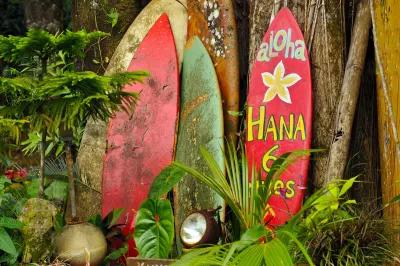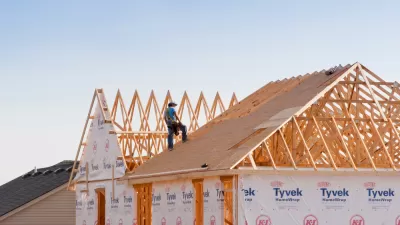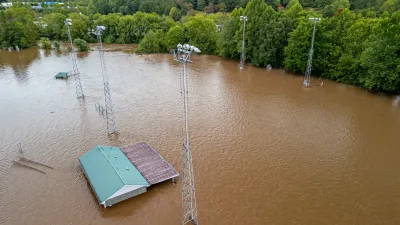“Surf Blocks” are fire-resistant, termite-proof, and close the loop on mountains of waste from the state’s beloved sport.

Housing in Hawai‘i is in short supply. So is space for landfills. But one Hawaiian architecture firm is aiming to change that, transforming polystyrene foam offcuts from surfboard manufacturing into a new building material similar in function to cinder blocks.
According to Honolulu Civil Beat, however, Surf Blocks’ performance blows cinder blocks out of the water. Developed by architecture firm Off Grid, they’re purportedly cheaper and more insulating as well as being termite and fire-resistant — a critical feature in the wake of Maui’s devastating fires. They also use about a third of the concrete — a carbon-intensive material — that cinder blocks do.
“The state has weighed several options to try to resolve chronic housing issues while also contending with climate change, marked in recent years by destructive weather events including the 2023 Maui fires. Construction materials are among the pain points, given that they are predominantly produced elsewhere, shipped to Hawaiʻi and sold here at a premium,” writes Thomas Heaton. At the same time, the islands’ limited landfills struggle to cope with large amounts of foam waste that is light, but space-intensive.
See pictures of the first home being built exclusively with Surf Blocks and read more below.
FULL STORY: Riding A Wave: Surfboard Waste Turned Into Building Blocks For New Homes

Planetizen Federal Action Tracker
A weekly monitor of how Trump’s orders and actions are impacting planners and planning in America.

Maui's Vacation Rental Debate Turns Ugly
Verbal attacks, misinformation campaigns and fistfights plague a high-stakes debate to convert thousands of vacation rentals into long-term housing.

San Francisco Suspends Traffic Calming Amidst Record Deaths
Citing “a challenging fiscal landscape,” the city will cease the program on the heels of 42 traffic deaths, including 24 pedestrians.

Amtrak Rolls Out New Orleans to Alabama “Mardi Gras” Train
The new service will operate morning and evening departures between Mobile and New Orleans.

The Subversive Car-Free Guide to Trump's Great American Road Trip
Car-free ways to access Chicagoland’s best tourist attractions.

San Antonio and Austin are Fusing Into one Massive Megaregion
The region spanning the two central Texas cities is growing fast, posing challenges for local infrastructure and water supplies.
Urban Design for Planners 1: Software Tools
This six-course series explores essential urban design concepts using open source software and equips planners with the tools they need to participate fully in the urban design process.
Planning for Universal Design
Learn the tools for implementing Universal Design in planning regulations.
Heyer Gruel & Associates PA
JM Goldson LLC
Custer County Colorado
City of Camden Redevelopment Agency
City of Astoria
Transportation Research & Education Center (TREC) at Portland State University
Jefferson Parish Government
Camden Redevelopment Agency
City of Claremont





























